

Bespoke Education. Bespoke Learning. New Learning Skills. New Memory Aids. New Learning. NewEd. EDUCATION. Other Learning. The Mind of a Middle Schooler: How Brains Learn. In my last post, I began a celebration of brains and made the argument as to why teachers need to brush up on their knowledge of brains in order to reach that all-too-allusive 'tween noggin.
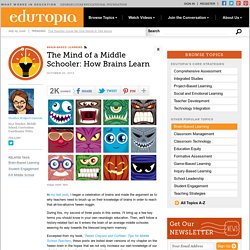
During this, my second of three posts in this series, I'll bring up a few key terms you should know in your own neurologic education. Then, we'll follow a history-related fact as it enters the brain of an average middle schooler, weaving its way towards the blessed long-term memory. Excerpted from my book, 'Tween Crayons and Curfews: Tips for Middle School Teachers, these posts are boiled down versions of my chapter on the 'tween brain in the hopes that we not only increase our own knowledge of our clientele, but share that knowledge with them as well. Brain Talk Before we proceed, here are some key words to know: Automatic Brain: This is also known as the reactive brain and makes up the remaining 83 percent of the brain. Amygdala: This monitors the emotions. In the Classroom. Brains, Brains, Brains! How the Mind of a Middle Schooler Works. In honor of October's most awesome of holidays, I am going to begin a three-part series about the gentlemen zombie's choice of cuisine: the 'tween brain.
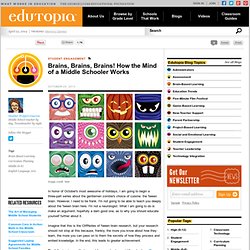
However, I need to be frank. I'm not going to be able to teach you deeply about the 'tween brain here. I'm not a neurologist. What I am going to do is make an argument, hopefully a darn good one, as to why you should educate yourself further about it. Imagine that this is the CliffNotes of 'tween brain research, but your research should not stop at this because, frankly, the more you know about how they learn, the more you can pass on to them the secrets of how they process and embed knowledge. For Teenage Brains, the Importance of Continuing to Learn Deeply. Big Ideas Daniel Horowitz for NPR By Shankar Vedantam, NPR John Hewitt is a neuroscientist who studies the biology of intelligence.
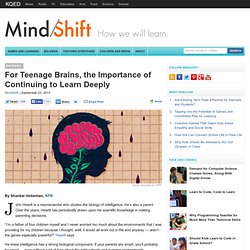
What Kids Should Know About Their Own Brains. Getty Neuroscience may seem like an advanced subject of study, perhaps best reserved for college or even graduate school.
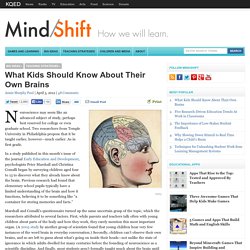
Two researchers from Temple University in Philadelphia propose that it be taught earlier, however—much earlier. As in first grade. In a study published in this month’s issue of the journal Early Education and Development, psychologists Peter Marshall and Christina Comalli began by surveying children aged four to 13 to discover what they already knew about the brain. Previous research had found that elementary school pupils typically have a limited understanding of the brain and how it functions, believing it to be something like “a container for storing memories and facts.” Marshall and Comalli’s questionnaire turned up the same uncertain grasp of the topic, which the researchers attributed to several factors. Boost Your Brain Power: 7 Tips for Improving Your Memory. Surely, constantly forgetting what you were doing in the middle of doing something and constantly looking for your misplaced house keys is not the ideal way to spend your golden years.
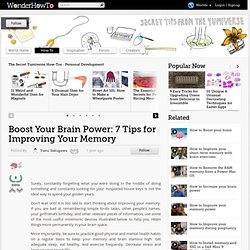
Don't wait until it is too late to start thinking about improving your memory. If you are bad at remembering simple to-do tasks, other people's names, your girlfriend's birthday, and other relevant pieces of information, use some of the most useful mnemonic devices illustrated below to help you retain things more permanently in your brain space. More importantly, be sure to practice good physical and mental health habits on a regular basis to keep your memory and brain stamina high. Get adequate sleep, eat healthy, and exercise frequently. Brain Plasticity Is A Critical Part of Learning And Relearning. Information Processing and the Brain. How The Memory Works In Learning. How The Memory Works In Learning By Dr.
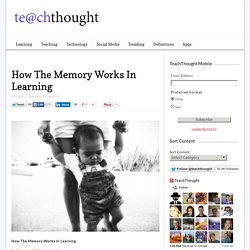
Judy Willis, M.D., M.Ed. Teachers are the caretakers of the development of students’ highest brain during the years of its most extensive changes. As such, they have the privilege and opportunity to influence the quality and quantity of neuronal and connective pathways so all children leave school with their brains optimized for future success. This introduction to the basics of the neuroscience of learning includes information that should be included in all teacher education programs.
How your brain likes to be treated at revision time. If you're a student, you rely on one brain function above all others: memory.
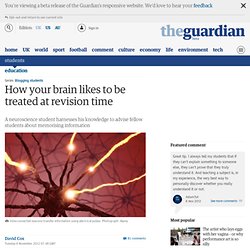
These days, we understand more about the structure of memory than we ever have before, so we can find the best techniques for training your brain to hang on to as much information as possible. The process depends on the brain's neuroplasticity, its ability to reorganise itself throughout your life by breaking and forming new connections between its billions of cells. The Genius in All of Us. How being called smart can actually make you stupid. A few months ago I posted a piece which has become my most popular blog post by quite a landslide.
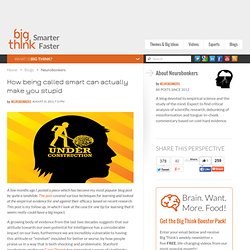
The post covered various techniques for learning and looked at the empirical evidence for and against their efficacy based on recent research. This post is my follow up, in which I look at the case for one tip for learning that it seems really could have a big impact. Graphic Organizers: Scientifically Based Research July 2003. Why Your Genius Has Gone Unnoticed and What To Do About It. You can increase your intelligence: 5 ways to maximize your cognitive potential. The views expressed are those of the author and are not necessarily those of Scientific American.

"One should not pursue goals that are easily achieved. One must develop an instinct for what one can just barely achieve through one’s greatest efforts. " —Albert Einstein While Einstein was not a neuroscientist, he sure knew what he was talking about in regards to the human capacity to achieve. Brain & Cognition. The reality is that maybe we have become a pill popping society.
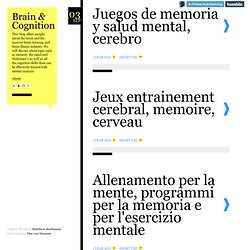
Neurolinguistics: Language and biology. Neurolinguistics: Language and biology Central Nervous System Peripheral Nervous System basic cellular unit (chemical transmission, neurotransmitters dopamine, serotonin, acetylcholine) 1. ISNR - Neurofeedback Therapy Through Research,Training, and Education. Evergreen Neurotherapy. Home » What is Neurofeedback Neurofeedback is simply biofeedback for the brain. Reaching a state of centered focus in life can be difficult or impossible if you have brain waves that are out of synch. Neurofeedback can help restore the right amount of each brainwave, and ensure that all of the brainwaves are in harmonious balance with each other. Neurofeedback is also called EEG biofeedback and has been around since the 1960s. Scientists have learned that certain disorders are associated with very distinctive brain wave patterns. A Whole New Mind: Why Right-Brainers Will Rule the Future. Your Brain by the Numbers.
Dyslexia/Learning Disabilities. Learning disabilities are caused by a difference in brain structure that is present at birth and is often hereditary. They affect the way the brain processes information, and can impact how a person learns to read, write, hear, speak and calculate. There are many types of learning disabilities, and they affect people differently. Learning disabilities are regarded as variations of normal development, and are only considered disabilities when they interfere significantly with school performance or adaptive functions. Learning disablilities often present with symptoms such as a delay in achieving developmental milestones in language, motor development or socialization.
Learning disabilities do not reflect IQ , instead, a person with a learning disability has trouble performing a specific types of skills or completing a task. How our mind read words. Corrigenda. April Phools.